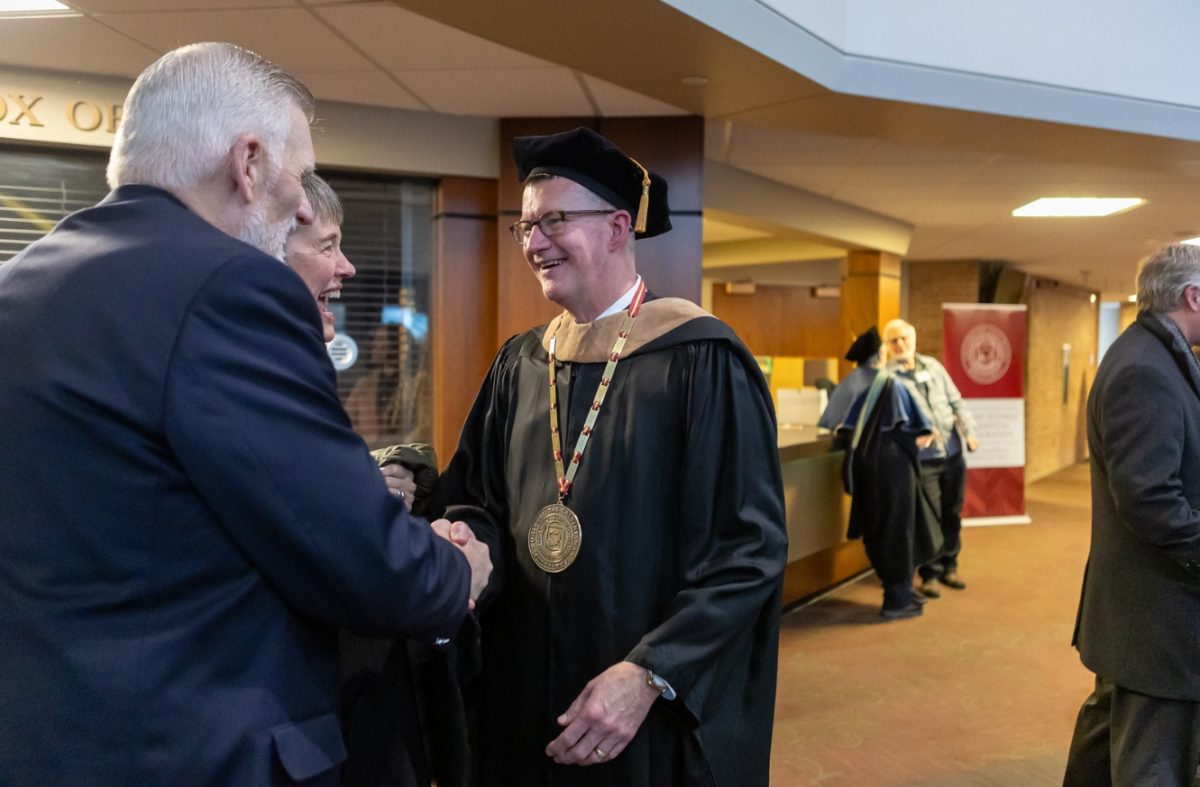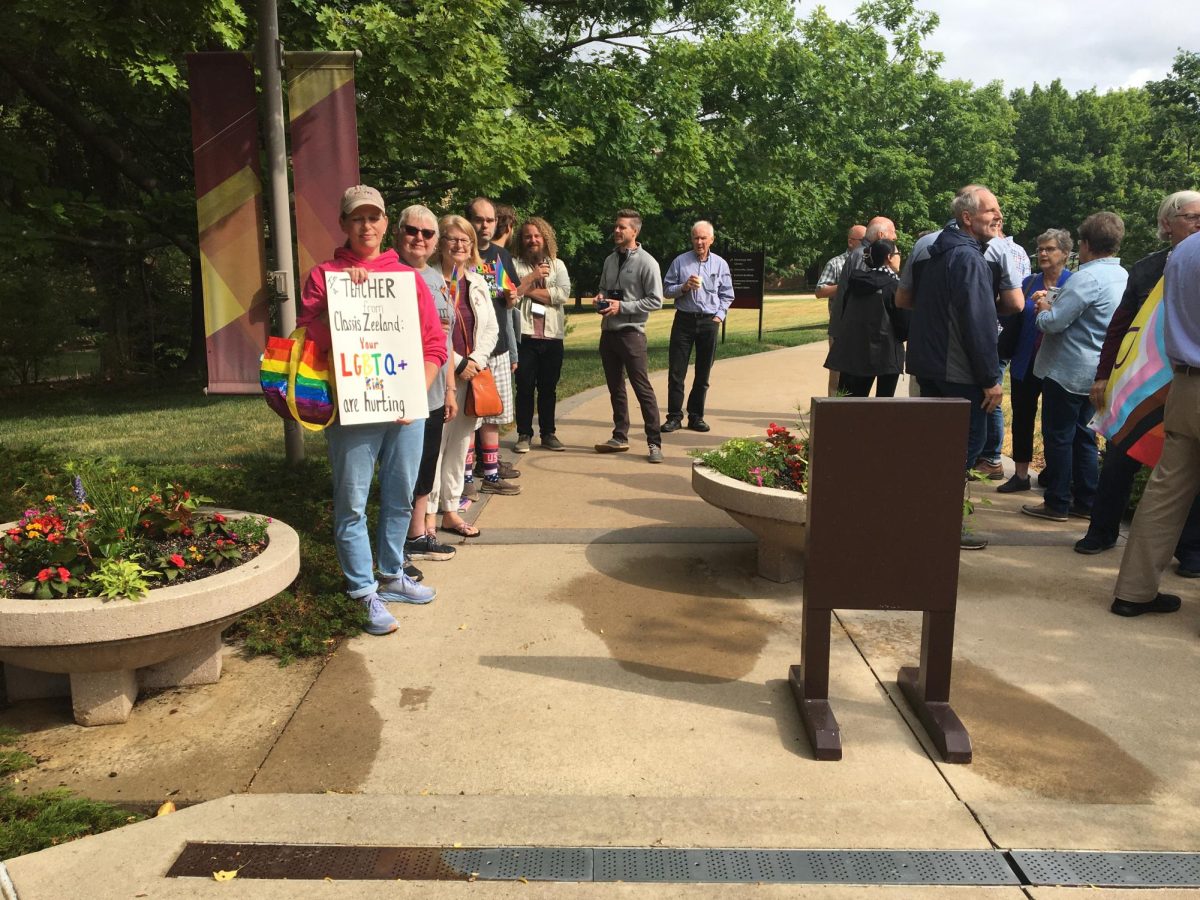On Friday, Jan. 24, Greg Elzinga was officially inaugurated as Calvin’s 13th president, nearly a year after assuming the role in an interim capacity. Chimes sat down for a post-inauguration conversation with President Elzinga, hoping to hear more about his vision for the future, the Vision 2030 strategic plan, and his understanding of what Calvin’s presidency means.
The conversation reprinted below has been edited for length and clarity.
Chimes: What are some of the first things you did as president?
Elzinga: So, one of the first things I did is say, hey, are we still committed to this vision of higher education? Is Vision 2030 still something that we believe is guiding us in a direction that we think is important for Calvin University in the landscape of Christian higher education?
And the answer was emphatically, yes, it is. So we’re not looking to change the vision. We are looking to simplify the way we get there a little bit.
My team and others will often hear me say, let’s decide what the most important programs and spaces are, where we need to invest to provide an extraordinary student experience and continue to ensure we have world-class professional programs.
As we talk about the liberal arts and humanities or social sciences, I think we need to reimagine and sometimes repackage the value of a liberal arts education. While it’s true that fewer and fewer students might be majoring in a liberal arts discipline, it’s still an extraordinarily important part of our educational experience here.
That’s what makes our doctors and nurses so valuable, our engineers or computer scientists, is that grounding in the liberal arts. I just think we — along with many other colleges and universities — have not done a very effective job explaining that to prospective students and especially to their parents.
But it’s those things that I think more and more schools are moving away from, and I actually would argue they continue to be an important part of our future. We just have to reimagine them a little bit in how we convey the value proposition to students.
Chimes: Does anything change about your role now that you’ve been formally inaugurated?
Elzinga: Well, nothing directly. So the direction that we were moving as a university through the leadership team — Vision 2030 — the continuing desire to have really strong professional programs grounded in a liberal-arts educational experience, all remain the same.
It’s also important for us to assess our leadership roles and structure to ensure we are well positioned to address the opportunities and challenges over the next three to five years, so we’re entertaining questions about what our organizational structure looks like. In terms of my role, it’s business as usual — focusing on things that will grow enrollment, engage more alumni and donors and develop our people and culture.
I’m also trying to take some of the reverence and awe out of the office of the president because I don’t think it’s healthy all the time. If I was the president of a hundred-million dollar a year company, people don’t walk around calling you Mr. President, right?
Quite honestly, I think that mentality can sometimes hinder colleges and universities even from responding to some of the challenges that we have ahead of us. The landscape of higher education is changing so quickly that I think, historically, the structure of higher ed is not well prepared for it.
Chimes: How do you think you’re going to look back and say, oh, well, this is how I’m going to measure I succeeded in this role? What’s your yardstick?
Elzinga: First, being able to deliver multiple years of a structurally balanced, sustainable budget, number one. We need to get there. Also, continued enrollment growth. I would love to see our undergraduate enrollment get back to 4,000.
Then, clarity around our relationship with the Christian Reformed Church and how we navigate some of the major issues that have been so dominant the last three years.
A few other things as well. We talk about an extraordinary student experience, right? I think we need to get a little bit more tangible with what that means. I want to look back, and if we will have achieved those things — a structurally balanced budget we’re delivering, clarity around our partnership with the denomination, continuing enrollment growth, maintaining or strengthening our academic reputation — and then getting a little bit more specific around what an extraordinary student experience looks like for our undergraduates.
Chimes: Is there anything else you’d like to share?
Elzinga: I’ll say what I’ve said since that time in February when I walked into the chapel for that first town hall meeting: I do remain incredibly optimistic about our future. We have a phenomenal campus community, from students, to faculty, staff and alumni. People want to see Calvin succeed, and we hold a pretty distinct place in the landscape of Christian higher education across this country.






